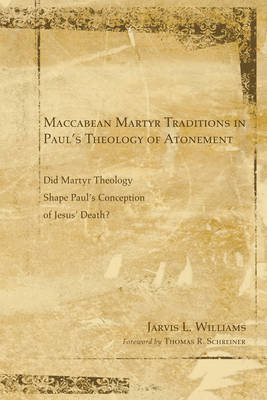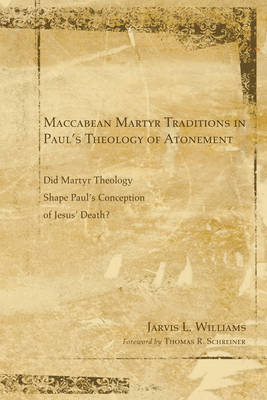
- Retrait gratuit dans votre magasin Club
- 7.000.000 titres dans notre catalogue
- Payer en toute sécurité
- Toujours un magasin près de chez vous
- Retrait gratuit dans votre magasin Club
- 7.000.0000 titres dans notre catalogue
- Payer en toute sécurité
- Toujours un magasin près de chez vous
Maccabean Martyr Traditions in Paul's Theology of Atonement
Did Martyr Theology Shape Paul's Conception of Jesus's Death?
Jarvis J Williams
Livre relié | Anglais
56,95 €
+ 113 points
Format
Description
In an age in which scholars continue to produce books on the nature and significance of Jesus's death, books that often assume the Old Testament cult was the New Testament authors' primary background for their conception of Jesus's death, Jarvis J. Williams offers a fresh and novel contribution regarding both the nature of and background influences behind Paul's conception of Jesus's death. He argues that Paul's conception of Jesus's death both as an atoning sacrifice and as a saving event for Jews and Gentiles was significantly influenced by Maccabean Martyr Theology. To argue his thesis, Williams engages in an intense exegesis of 2 and 4 Maccabees while also interacting with other Second Temple Jewish texts that are relevant to his thesis. Williams further interacts with relevant Old Testament texts and the key texts in the Pauline corpus. He argues that the authors of 2 and 4 Maccabees present the deaths of the Jewish martyrs during the reign of Antiochus Epiphanes IV as atoning sacrifices and as a saving event for Israel. He further argues that, although the Old Testament's cultic language certainly influenced Paul's understanding of Jesus's death at certain junctures in his letters, the Old Testament cult alone-which emphasized animal sacrifices-cannot fully explain why or even how Paul could conceive of Jesus's death, a human sacrifice, as both an atoning sacrifice and a saving event for Jews and Gentiles. Finally, Williams highlights the lexical, theological, and conceptual parallels between Martyr Theology and Paul's conception of Jesus's death. Even if scholars disagree with Williams's thesis or methodology, serious Pauline scholars interested in the background influences behind and the nature and significance of Jesus's death in Paul's theology will want to interact with this work.
Spécifications
Parties prenantes
- Auteur(s) :
- Editeur:
Contenu
- Nombre de pages :
- 156
- Langue:
- Anglais
Caractéristiques
- EAN:
- 9781498252874
- Date de parution :
- 01-01-10
- Format:
- Livre relié
- Format numérique:
- Genaaid
- Dimensions :
- 152 mm x 229 mm
- Poids :
- 381 g

Les avis
Nous publions uniquement les avis qui respectent les conditions requises. Consultez nos conditions pour les avis.






